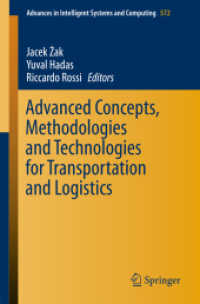Full Description
Assuming that women's empowerment would accelerate the pace of social change in rural Nepal, the World Bank urged the Nepali government to undertake a "Gender Activities Project" within an ongoing long-term water-engineering scheme. The author, an anthropologist specializing in bureaucratic organizations and gender studies, was hired to monitor the project. Analyzing her own experience as a practicing "development expert," she demonstrates that the professed goal of "women's empowerment" is a pretext for promoting economic organizational goals and the interests of local elites. She shows how a project intended to benefit women, through teaching them literary and agricultural skills, fails to provide them with any of the promised resources. Going beyond the conventional analysis that positions aid givers vis-à-vis powerless victimized recipients, she draws attention to the complexity of the process and the active role played by the Nepalese rural women who pursue their own interests and aspirations within this unequal world. The book makes an important contribution to the growing critique of "development" projects and of women's development projects in particular.
Contents
List of illustrations
Foreword
Preface
Map of Nepal
Acknowledgments
Introduction
Development Projects - Persistence Despite Evident Failure
"Development" and "Development Projects" - Neocolonialism behind Social Change Discourse
Economic and Gendered Critique of Development and the World Bank
Do Micro-finance Schemes Help the Poor and Women in Developing Countries?
The Comeback of "Development" Theories - Maiava's Study as an Example
Development and Women's Empowerment Projects
The Construction of Third World Women's Underdevelopment and Subordinated Femininity
Postmodern Feminist Theory Trapped in Development Discourse
Ambivalence in Discussing the Futility of Gender Development Projects
Gender, Development and Literacy in Nepal
The "Third World" Image of Nepali Women
Nepali Women's Participation in the Maoist Insurgency
Power, Poverty and Women's Illiteracy in Nepal
Methodology
Chapter 1. The Vulnerable Patron: Playing the Role of a Foreign Gender Consultant
Patronage and Power-dependence Relations
Deceitful Hierarchy - Privileged Experts and Low-ranked Paraprofessionals
The Compelling Power and Appealing Advantages of the Consultant's Position
Manufacturing the Image of a Gender Expert
A Tourist in Disguise
The Professional Care-taker
In the Name of Women's Good
Confronting Men's Chauvinism
Patronizing Anita
Complying with Expectations to Patronize the Village Men
Patronizing Male Officials
Veiled Vulnerability
Reluctant Patron, Vulnerable Foreigner
Chapter 2. Instrumental Patronage: Leon and Hanna
Leon, as a Bossy Patron
Complying with Hanna's Dominance
The Betrayed Patron
Imposing Discretion for the Sake of Dominance
Serving Tea and Power Gaps
The Jeep - Symbolizing and Contesting Superiority
A Eidiculed Patron
Abusing the Defenseless Indoors
Bribery, Drunkenness and Ethnocentrism - Cooperation and Mutual Dependence
Chapter 3. The Phantom of Literacy Classes for Women Villagers
Literacy and Economic Resources - On Paper
Recommending Literacy - Fenster's Report
Illiteracy as a Case for Foreign Expertise - My Report
Successful Negotiations for Stalling Time
The Project's Reports, The Social Order and Developers' Compliance
Chapter 4. The Role of Economic Activities in Negotiating Consent
Development Tourists and Collaborating Village-women
Visiting Ekala, "Literate Developers" Meet "Illiterate Villagers"
Visiting Khumundihawa, Intruders Meet Locals
Visiting West Baharaulia - Procedural Rituals and Cracking Stereotypes
Structured Social Distance and Men's Marginality in the Village Encounters
The Village Women's Assertiveness
Visiting Bhawarabari, Women Leaders and Economic Issues
Brindban and Sikatahan, Encountering a Field-bank and Village Women's Enterprises
Manipulative Developers
Ignoring the Women's Wishes and Deluding Them
Foreign Agencies Take Over Responsibilities of State Authorities
The Appeal of Women's Organized Groups to Financial Agencies
The Appeal of the Village Women Groups from the NGOs' Perspective
The Village Women - Neither Naïve nor Passively Manipulated
Illiteracy as a Means for Establishing the Image of Women's Collective Intellectual Failure
Chapter 5. The Seminar - The Successful Failure of the Women's Empowerment Project
Manufacturing a Fictitious Success - The Seminar and Thapa's Class
The Collaboration of the World Bank with the Nepali and Israeli Partners in Faking Progress
The Seminar as a Platform for Exercising Men's Power - The Use of Cultural Discourse
Bossing Women in the Hierarchic Setting of the Irrigation Project
Men's Supervision Over the Women in the Seminar
No Books for the Seminar - Men's Stalling and Women's Anxiety
The Seminar - Degrading and Disempowering Women
Chapter 6. Gender and the Phantom Budget
A Women's Budget in a Male Dominated Context
A Flexible Budget and Feminine Compliance
Gender Consultants Accommodating to the Power of Men
Stimulating Hopes, Providing Vague Promises
Disillusioned Hopes: Gradual Unfolding of the Bluff
Men's Game: Power, Aggression, Devaluating Women's Matters
Becoming Part of the System: A Coopted Feminist
Manipulating Facts and Figures
Feminine Coping with Confusing Messages and Stalling Tactics
Unveiling the Truth: Women's "Peanuts" Money for Men's Bonuses
No Budget for Women's Activities
References
Index








